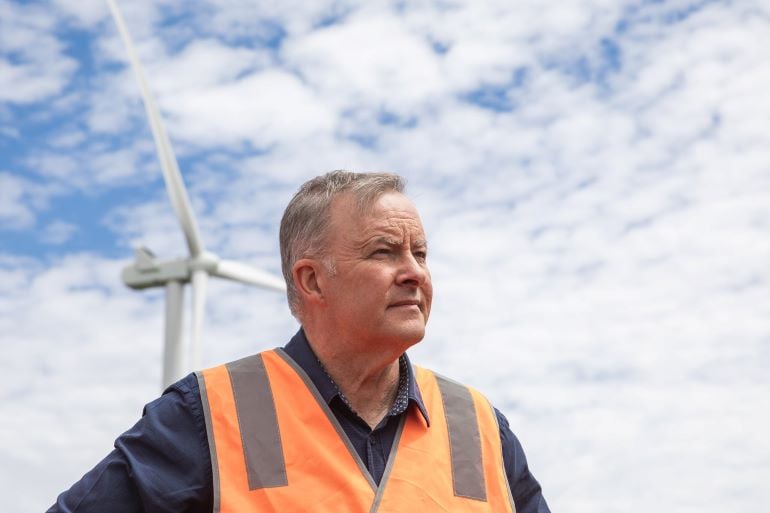The Big Sausage Sizzle on Saturday changed the government, with Labor under Antony Albanese heading towards a majority in the lower house, or at least taking people with support from an expanded crossbench.
The result has been widely welcomed by the tech and startup sectors, with Labor’s Ed Husic expected to continue in the innovation minister role.
Among the policies Labor offered ahead of the poll, it promised an Electric Car discount from FY2023, that could cut the cost of an EV by around $2000.
Here’s what several tech leaders said about the result and what they’re now hoping the government will deliver.
Kate Pounder
CEO, The Tech Council of Australia (TCA)
Bring on the $1bn Critical Technologies Fund

Tech Council CEO Kate Pounder
Over the course of the campaign, the Labor Party has announced a number of crucial initiatives aimed at helping to grow Australia’s incredible technology sector.
TCA worked with Australia’s new Prime Minister, the Hon. Anthony Albanese, prior to his appointment when he committed to support the goal of having 1.2 million people in tech jobs by 2030.
Setting this goal on behalf of Government matters because it sends a clear signal to Australians that employers will sign-up to create these jobs, and there is a shared commitment to help Australians work in them, including through reskilling and training opportunities.
We want to partner to create great, well-paid, secure jobs for Australians, and to make sure the right training is in place to help Australians get into them.
We look forward to working with Prime Minister Anthony Albanese, and longstanding technology sector supporters, including Hon. Ed Husic, Treasurer Jim Chalmers, Hon. Tim Watts, Hon. Dr Anne Aly, and the new front bench, to further grow the Australian technology sector and create Australian jobs.
In addition to the jobs goal, Mr Albanese and Mr Husic outlined a Critical Technologies Fund to deliver $1 billion in investment support through loans, equity and guarantees for businesses in critical technologies.
This fund will enable the tech sector to capitalise on this once in a generation opportunity to make Australia a global tech powerhouse – to deliver billions in economic activity, provide secure, flexible, well-paid jobs for Australians and make Australia the best place to start and grow a business.
Over the last decade, Australia has shown it can create globally successful tech companies from locations ranging from Sydney to the Sunshine Coast. This includes success stories such as Atlassian, Canva, Afterpay, Wisetech, Seek, REA, Airwallex, SafetyCulture, Go1, Cultureamp and Employment Hero.
Our success means that 2.2% of the world’s tech unicorns ($1Bn companies) have come from Australia, even though our share of global GDP is just 1.6%. It shows we can punch above our weight in the global tech race. Critically, it also shows Australia has gained an important, new industrial strength in our economy: software development.
Now we need to do the same for the next generation of strategic tech industries. That is why we are especially pleased to note the fund will target key areas including quantum computing, artificial intelligence, robotics and software development.
Australia already has a good head start in areas such as quantum where according to research from McKinsey we attract 3.6 % of global funding for quantum, compared to our 1.6% share of GDP. However, we do believe there is a genuine funding gap for these next-gen strategic industries, and this fund will help complement existing private funding.
Andrew Porter
CEO, FinTech Australia
Keep the momentum

Fintech Australia CEO Andrew Porter
This result shows an appetite for change across Australia, and I feel the technology and fintech sector are key to that.
While tech didn’t necessarily feature as a key factor this election, Labor made a point of bringing an agenda for the sector to the forefront, regardless of how it would poll.
With this in mind, we’re excited about how an Albanese-led government will interact with the industry, and look forward to working closely with them on various issues including the rollout of the Consumer Data Right, PayTo’s launch, and cryptocurrency regulation.
All three will be key in empowering consumers to make better financial decisions. When implemented, the CDR and PayTo could potentially arm them to ease their own cost of living pressures.
We’re seen a lot of momentum on all of these policies over the past few years under a Morrison Government, and we look forward to keeping that going.
Ron Gauci
CEO, Australian Information Industry Association (AIIA)
Appoint a Digital Minister
The AIIA looks forward to working closely with the Labor Party to develop and deliver policy for our critical technologies, tech regulation, manufacturing and to address our urgent digital skills shortage. The government has the opportunity to cement Australia as a leading digital economy by 2030, which would be a significant achievement and something to be incredibly proud of.
A dedicated cabinet level Minister of Government Services and the Digital Economy is needed to deliver on the digital opportunities available to Australia. The growth of Australia’s digital and innovation economy demands a dedicated minister, as it is now Australia’s third largest economic sector.
Our sector could easily employ 1.5 million Australians in the next few years if the government addresses our skills shortage and supports the sector. Our members have told us they are increasingly looking overseas for employees due to the talent squeeze. Red tape is restricting the digital economy and could be far better targets and coordinated. A dedicated cabinet minister is needed to address these issues and support the ongoing growth of our digital economy.
The recent funding commitments for our innovation sector, digital skills and critical industries are extremely pleasing. However, we have seen in recent years funding being committed but held up by bureaucracy, causing significant delays in the funding reaching industry. Our commercialisation of Australian IP needs greater support to continue to deliver growth and jobs in Australia, ensuring our IP is not sold overseas. A dedicated minister will support seeing the funding delivered to industry to support Australia’s digital economy and digital capabilities.
The AIIA will seek to work with the incoming government on its Future Made in Australia domestic procurement policy to ensure Australian ICT companies are strongly considered to work with the government.
The AIIA looks forward to meeting with the government to continue to discuss how our innovation and digital technologies can support Australia’s continued economic prosperity and leadership in the digital economy.
Ian Yip
CEO, Avertro
Sort the skills shortage

Ian Yip
Australia’s startup sector punches way above its weight considering it isn’t a priority for our government, Australia’s strong border restrictions throughout the pandemic, and our market size.
Local startups know how to move quickly and provide vibrant training grounds for new talent, and as we continue to see growing demand for tech skills among a labour shortage, our government needs to adopt immigration policies that reflect this level of dynamism.
For example, visas that require multiple years of work experience in order for someone’s skills to be considered no longer reflect our work environments.
Software engineering graduates can be valuable within a matter of months with the right support and attitude. Our immigration policies should be empowering this new generation of fast-learners and entrepreneurial minds.
Prof Hugh Bradlow
The Australian Academy of Technology and Engineering (ATSE)
Decarbonise urgently and invest in STEM workforce
The new government has a critical window of opportunity to position Australia as a technological powerhouse driven by a clean and sustainable economy, highly skilled workforce and world-class research activity and commercialisation.
Australia requires bold action to tackle climate change, driven by mature and emerging technologies within the framework of a comprehensive regulatory plan to achieve net zero emissions by 2050 or earlier. ATSE urges the government to meet and beat their current commitment.
Labor’s commitment to a 43% reduction by 2030 is an improvement on past performance and the Powering Australia plan will help to achieve this and create jobs in clean energy. However urgent and ambitious action is needed now to scale renewable technologies, electric vehicles, and restore the Climate Change Authority.
It’s now or never to make deep cuts to our emissions and we have the technology to do so. We need to fast track to a clean future which delivers jobs, economic growth and prosperity for all Australians.
Australia has a window of opportunity to become a world leader in renewable energy generation, low and negative emission technologies – but that window is rapidly closing. We urge the new Australian Government to act now and not squander our renewable technology advantage by implementing a comprehensive plan that transitions to a net-zero emissions economy, backed by regulation and incentives
ATSE also looks forward to collaborating with the government in transforming Australia into a STEM superpower through bolder strategic R&D investment and addressing the shortfall in STEM skilled workers.
Labor’s commitments, including the targeting of 1.2 million tech jobs by 2030 through the Start-up Year program, government procurement policy, and the National Reconstruction Fund, are welcome opportunities. ATSE urges the Labor Government to prioritise these initiatives along with the establishment of the proposed defence innovation agency.
Applied science, technology and engineering continue to help Australia navigate through the pandemic but we need a comprehensive plan that assures Australia’s sovereign capabilities and secures Australia’s economic future.
We will need 100,000 more digitally skilled workers by 2024 and 40,000 more engineers by 2025. The new government must implement a plan to tackle the decline in STEM achievement of Australian school students and recognise this as the foundation for generating game-changing skills, new jobs and abundant economic returns.
The Academy, which counts more than 900 of Australia’s leading applied scientists, engineers and technologists, looks forward to its continued collaboration with the Australian Government in shaping a technology powered, human driven future for all Australians.
Riley Mongan
CEO & founder, K Safe
Empower the next generation

Riley Mongan, K Safe
Our startup scene is far behind what it could be, and drastically lags behind markets like Silicon Valley, however it is growing and there is huge potential for Australian entrepreneurs to pioneer new categories and innovations that go global.
As the Australian startup ecosystem evolves, we need to ensure that we learn from some of the downfalls of startup hubs overseas so that we don’t replicate the same problems.
One of the biggest challenges is empowering younger generations to innovate, while supporting their mental health. It used to be easy to identify a ‘get rich quick scheme’, but these days the entire startup world can be mistaken as something that is cheap and easy, and will reap fast and significant financial benefits.
As young entrepreneurs join this sector, they need to be supported with the right information and people they can trust. We’re going to have a better chance of building a trusting, safe, and supportive startup ecosystem if we have less polarisation in our communities and governments.
Ron Curry
CEO, IGEA (Interactive Games & Entertainment Association)
A global hub for gaming
IGEA congratulates and welcomes the incoming Albanese Labor Government and looks forward to continuing the dialogue around supporting the Australian video games industry.
The Australian Labor Party has a proud history of supporting Australian game developers. We have not forgotten that the previous Labor Government in 2013 established Australia’s first major federal game development fund, the Australian Interactive Games Fund.
We have worked incredibly closely across all sides of Parliament to educate policy makers about video games and the opportunities that the game development industry can provide economically to Australia.
As the competition for talent and the establishment of studios based in the global industry continues to increase, we can’t afford to lose any momentum with the excellent groundwork that has been established in Australia already and ask the incoming Albanese Labor Government to help us cement Australia as a global hub for this highly creative and technical industry.
Ross McDonald
Country Manager, Perkbox Australia
Address the talent shortage

Ross McDonald, Perkbox Australia
The outcome of this election shows that Australians are ready for change, and I think that bodes well for the technology sector as a whole as it is an instrument of progress.
Given they released more policies both before and during the campaign regarding the sector, they seem keen to work more closely with the industry too.
There’s a lot on the new government’s plate, not to mention immediately tackling climate change and setting up an integrity commission. But I’m sure the technology sector will be chasing certainty about a policy response to tackle the talent shortages gripping the industry.
Labor promised a program to train talent to join the ecosystem, which is a fantastic medium to long-term measure. But the current shortage is holding companies back and needs a more immediate response to ensure the companies looking to hire today are still around to employ the graduates of tomorrow.
Noel Allnutt
Managing Director, Sekuro
Cut the barriers to tech jobs

Noel Allnutt
The March Federal Budget announcement saw the Morrison Government confirm they would commit to reforming the Employee Share Scheme rules (ESS), an initiative that was very much welcomed by the tech community.
The changes will see the removal of the cap on the number of shares or options that can be issued, and an increase in the value cap of shares from $5000 to a monetary cap of $30,000 per year. In addition, shares and options issued by local companies will now be treated the same way as those issued by those domiciled overseas, for tax purposes.
We also saw the introduction of rebates to encourage the adoption of digital technologies, including cybersecurity.
The tech industry has suffered from a skills shortage for the better part of a decade, and this was only made worse by the pandemic and the lack of overseas workers available to fill these gaps.
We can’t afford to put more barriers in place that will negatively impact Australia’s tech innovation. If we want to seriously address the talent shortages in technology, especially in cyber security, we need to move quickly and creating attractive workplaces that can offer competitive salary packages is a must.
The digital economy is the backbone of Australia’s future and we need our governments to recognise this and invest accordingly to ensure Australia’s tech is competitive on the world stage. 2022 is the year for the growth of our digital economy to become a key election issue.




















Trending
Daily startup news and insights, delivered to your inbox.